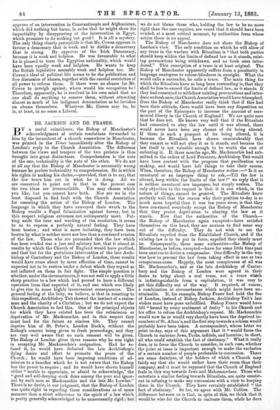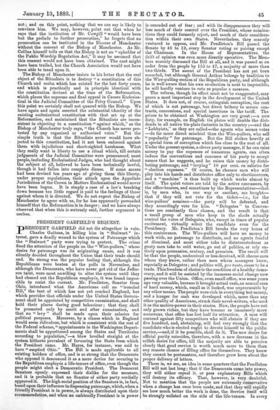DR. JACKSON AND DR. FRASER. B Y a useful coincidence, the
Bishop of Manchester's acknowledgment of certain resolutions forwarded to him by the incumbent of a church somewhere in Manchester, was printed in the Times immediately after the Bishop of London's reply to the Church Association. The difference between the views and tempers of the two prelates is thus brought into great distinctness. Comprehension is the note of the one, technicality is the note of the other. We do not at all say that the Bishop of Manchester is necessarily wrong because he prefers technicality to comprehension. He is within his rights in making his choice,—provided, that is to say, that the law bears him out in what he is doing. All we are concerned to point out is that in the present case the two ideas are irreconcilable. You may choose which you like, but you cannot have both. Nor are we in the least disposed to find fault with the Church Association for resenting the action of the Bishop of London. The language in which they have .conveyed their wrath to the Bishop recalls a Papal fulmination against heresy, but in this respect religious extremes not unfrequently meet. Put- ting aside the tone and wording of the resolution, it seems to us to express a perfectly natural feeling. They have been beaten ; and what is more irritating, they have been beaten by what is neither more nor less than a condoned evasion of the law. Those who are persuaded that the law which has been evaded was a just and salutary law, that it aimed at results by which the Church of England would have profited, .and that but for the gratuitous intervention of the late Arch- bishop of Canterbury and the Bishop of London, these results would have come about by mere effiuxion of time, cannot be expected not to be restive under a defeat which they regard as not. inflicted on them in fair fight. The simple question is whether, under the circumstances,it was not well to apply a little sharp practice to a law which had proved to have a different operation from that expected of it, and one which was likely to give rise to some highly inconvenient consequences. The general feeling of the laity, we believe, is that in resorting to this expedient, Archbishop Tait showed the instinct of a states. man and the charity of a Christian ; but we do not expect the Church Association to feel this. One of the principal objects for which they have existed has been the submission or deprivation of Mr. Mackonochie, and in this respect they must lead for the future an aimless life. They cannot deprive him of St. Peter's, London Dock's, without the Bishop's consent being given to fresh proceedings, and they are very well aware that no such consent will be given. The Bishop of London gives three reasons why he was right in accepting Mr. Mackonochie's resignation. Had he re- fused it, he would have defeated the late Archbishop's dying desire and effort to promote the peace of the Church ; he would have been imposing conditions of ad- mission to a benefice which he is not aware that the Bishop has the power to require ; and he would have shown himself either " unable to appreciate, or afraid to acknowledge," the "good and self-denying work done among the poor and ignor- ant by such men as Mackonochie and the late Mr. Lowder." - There is no doubt, in our judgment, that the Bishop of London was quite right in regarding these considerations as of more moment than a strict adherence to the spirit of a law which is pretty generally acknowledged to be unnecessarily rigid ; but we do not blame those who, holding the law to be no more rigid than the case requires, are vexed that it should have been evaded, at a most critical moment, by authorities from whose action there is no appeal. The Bishop of Manchester does not share the Bishop of London's view. The only condition on which he will allow of any truce in the warfare with Ritualism is " that both parties should keep within the limits of defined law as it stands, exist- ing provocations being withdrawn, and no fresh ones intro- duced." This conception of a trace is at least original. The Bishop of Manchester apparently suffers from a peculiarity in language analogous to colour-blindness in eyesight. What the world calls a surrender, he calls a truce. The main thing for which the Ritualists have so long been contending-is, that they shall be free to exceed the limits of defined law, as it stands. If they had consented to withdraw existing provocations and intro- duce no fresh ones, the Church Association would have triumphed. Does the Bishop of Manchester really think that if this had been their attitude, there would have been any disposition on the part of the Episcopate to increase the amount of cere- monial liberty in the Church of England We are quite sure that he does not. He knows very well that if the Ritualists had consented to obey the law until it was altered, there would never have been any chance of its being altered. If there js such a prospect of its being altered, it is because the Ritualists have shown unmistakeably that they cannot or will not obey it as it stands, and because the law itself is not valuable enough to be worth the cost of enforcing it. If, three months ago, Mr. Mackonochie had sub- mitted to the orders of Lord Penzance, Archbishop Tait would have been content with the progress that pacification was making, and would have left things to take their course. When, therefore, the Bishop of Manchester writes :—" Is it an unnatural or an improper thing. to ask,—Till the law is altered, keep within the limits of the law ?" we reply that it is neither unnatural nor improper, but simply useless. The only objection to the request is that it is one which, in the nature of things, cannot be granted. The Ritualists know perfectly well that the reason why their position to-day is so much more hopeful than it was ten years since, is that they have convinced everybody except the Bishop of Manchester that they prefer deprivation to obeying the law as it stands. Now that the authorities of the Church— the Bishop of Manchester again excepted—have satisfied themselves on this head, they are anxious to find some way out of the difficulty. They do not wish to see the Ritualists expelled from the Established Church, and if the existing law is to be put in force, expelled they clearly must be. Consequently, these same authorities—the Bishop of Manchester, as before, excepted—have for some little time past been anxious to devise a compromise. One difficulty in the way was how to prevent the law from taking effect in one or two conspicuous cases. Happily, the most conspicuous of all was Mr. Mackonochie's, and as the late Archbishop of Canter- bury and the Bishop of London were agreed in their desire to bring about a real truce, not a truce which is indistinguishable from a capitulation, it was easy to get this difficulty out of the way. It required, of course, a combination of circumstances which might have been un- attainable. • If, for example, Bishop Fraser had held the See of London, instead of Bishop Jackson, Archbishop Tait's last wishes must have gone unfulfilled. Bishop Fraser would have felt "bound by every sentiment of fealty" to his Church and his office to refuse the Archbishop's request. Mr. Mackonochie would now be or would very shortly have been the deprived in- cumbent of St. Alban's, and the first step towards a schism would probably have been taken. A correspondent, whose letter we print to-day, says of this argument that it "would force the Church to embrace Jews, Turks, infidels, and heretics ; in short, all who could establish the fact of obstinacy." What it really does, is to force the Church to consider, in each case, whether the point at issue is important enough to make the exclusion of a certain number of people preferable to concession. There are some doctrines, of the holders of which a Church may fairly say that she would rather have their room than their company, and it must be supposed that the Church of England feels in this way towards Jews and Mahommedans. Those who entertain a similar feeling towards Ritualists, are quite consist- ent in refusing to make any concessions with a view to keeping them in the Church. They have certainly established " the fact of obstinacy." • So far, we agree with Mr. Collins. The . difference between us is that, in spite of this, we think that it would be wise for the Church to embrace them, while he does not ; and on this point, nothing that we can say is likely to convince him. We may, however, point out that when he says that the institution of Mr. Cowgill " would have been but the prelude to further prosecution," he forgets that no prosecution can be instituted in the Diocese of Manchester without the consent of the Bishop of Manchester. As Mr. Collins himself tells us that the Bishop is not an " upholder of the Public Worship Regulation Act," it may be assumed that this consent would not have been obtained. The coat might have been trailed, but the Church Association would not have been able to tread upon it.
The Bishop of Manchester insists in his letter that the real object of the Ritualists is to destroy " a constitution of this Church and realm which has existed for the last forty years, and which is practically and in principle identical with the constitution devised at the time of the Reformation, which places the supreme and final appeal in Causes Ecclesias- tical in the Judicial Committee of the Privy Council." Upon this point we certainly shall not quarrel with the Bishop. We have again and again asserted the substantial identity of the existing ecclesiastical constitution with that set up at the Reformation, and maintained that the Ritualists are incon- sistent in objecting to a constitution " against which," as the Bishop of Manchester truly says, " the Church has never pro- tested by any organised or authorised voice." But the simple truth is that the Ritualists never would have ob- jected to this constitution, had it not been enforced against them with injudicious and short-sighted harshness. What they really want is liberty to use a ritual which, till certain judgments of the Judicial Committee were pronounced, most people, including Ecclesiastical Judges, who had thought about the subject at all, believed to have been technically lawful, though it had fallen into complete disuse. If some means had been devised ten years ago of giving them this liberty, under proper regulations, their attack upon the Appellate Jurisdiction of the Crown in Matters Ecclesiastical would never have been begun. It is simply a case of a law's breaking down because too little regard is paid to the feelings of those against whom it is directed. We do not expect the Bishop of Manchester to agree with us, for he has apparently persuaded himself that the Reformation is in danger ; and we have always observed that when this is seriously said, further argument is useless.



































 Previous page
Previous page